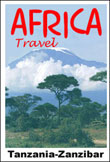|
|
 . . .. .. . . .. .. ........ |

|
|
|
Tanzania's
Ecotourism Program
3- To interpret the Rio Summit's Agenda 21 in the concrete conditions of Tanzania's environment and help propagate the Rio Summit message of judicious management of the environment for sustainable development and survival of our Mother Planet Earth, through programs aimed at educating and equipping local communities to solve their own environmental problems. 4- To create and develop an environmental database through local research as well as through networking with worldwide data banks of groups involved in environmental work. 5- To evaluate and document the
environmental consequences of the life activities of nomadic
pastoralists of Tanzania (like the Masai, Barbaic, taturu);
semi-sedentary cultivators (like the Wasukuma, wagogo); and
the hunter-gatherer communities (like the Wahadsabe),
highlighting the ecological dangers posed by over stocking,
deforestation and seasonal wildfires. An even more
significant objective is to study how these communities have
managed to sustain their mode of production for centuries in
often arid lands and how modern agriculture will affect
them. 7- To inculcate, popularize and use the concepts of problem based learning through community participation in the identification of an environmental problem (like declining soil fertility), debating its causes (e.g. bad tillage practices) and arriving at a solution by the community itself agreeing on a remedy (like terracing) 8_ To operate pilot tree nursery schemes and propagate tree planting by villages, neighborhood urban communities, women and youth groups for land re vegetation or fuel wood purposes, or fruit tree growing for income generation and the community's nutritional status improvement. 9- To educate and sensitive the community to undertake the protection of endangered species of our flora and fauna, including endangered parts of our marine environment, river systems, inland lakes, pristine nature reserves like the Serengeti plains and the Ngoronbogoro Crater, as the delicate ecology of equatorial snow-capped Mount Kilimanjaro. 10. To catalogue, research on and document indigenous species of medicinal plants and herbs and wage campaigns for their preservation, development and utilization in the cure of diseases and generally to work towards the preservation of Tanzania's biological species in line with the 1992 Rio Convention on Biological diversity. 11- To study and monitor climate change in the specific conditions of Tanzania and particularly its adverse impact on food security and the preservation of species, and focus national attention on renewable energy technologies (RETs) for use by industry and our rural and urban communities in humanity's struggle to save our planet from the rising dangers of carbon dioxide emissions and nuclear energy. 12. To educate the community about the dangers and factors of environmental pollution and the dumping of toxic waste in our poor countries, and participate in anti-pollution campaigns through networking with sister environmental groups. 13. To monitor the environmental consequences of conflict-driven mass exodus of refugees (e.g. from Rwanda, Nurundi and former Eastern Zaire into the Kagera and Kigoma regions of Tanzania, which are quickly becoming ecological disaster areas due to destruction of forests by refugees in search of fuel wood), and trigger government action as well as international sympathy and assistance. 14. To study and highlight the harmful effects of over commercialized mass tourism and campaign for sustainable environment-friendly eco-tourism practices. 15. To preserve and protect from environmental pollution Tanzania's archeological and historic-cultural sites like the Oldvai Gorge, the Laetoli Prehistoric Footprints, relics of the slave trade caravan routes, the Bagamoyo and Kilwa Ruins, and the Old Zanzibar Slave Market site.
|
home .ads, ata...e-mail ,,events ffashion.,food,.hotels ..map...news .subscribe..usa-canada


 2-
To work with Community groups, other NGOs, government
departments as well as foreign agencies involved in
environmental issues to propose and help implement
environmental policies initiatives.
2-
To work with Community groups, other NGOs, government
departments as well as foreign agencies involved in
environmental issues to propose and help implement
environmental policies initiatives.